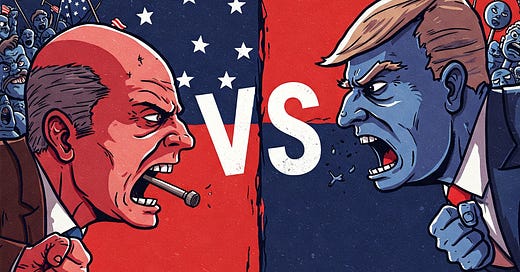The American political landscape is increasingly polarized, and the rhetoric surrounding this division has become alarmingly heated. In his book, "American Crusade," Pete Hegseth paints a stark picture of a nation under siege, threatened by what he perceives as the encroaching "leftist specter." His views, marked by extreme rhetoric and a call for an "American crusade," have ignited controversy and raised serious concerns about their impact on American democracy and social cohesion. Lets delve into Hegseth's core arguments, examine their implications, and provide context from various sources.
Hegseth's Core Arguments:
Hegseth's central thesis is that America is engaged in an existential battle against "leftists," whom he portrays as enemies of freedom, the Constitution, and the nation itself. He asserts that "irreconcilable differences between the Left and the Right in America lead to perpetual conflict that cannot be resolved through the political process". This belief fuels his call for an "American crusade," a "360-degree holy war for the righteous cause of human freedom," aimed at "exorcising the leftist specter dominating education, religion, and culture".
Key elements of his ideology include:
Rejection of Democracy: Hegseth equates calls for "democracy" with a leftist agenda, claiming they seek to "amass 51 percent of the votes to change" the Constitution. He even advocates for gerrymandering to "screw Democrats".
"Americanism" as Right-Wing Populism: He champions "Americanism," defined as opposition to feminism, globalism, Marxism, and progressivism, presenting it as an all-or-nothing proposition: "either 'Americanism' will prevail or 'death' will".
Demonization of the Left: Hegseth portrays leftists, progressives, and Democrats as "enemies" of freedom and the Constitution, using inflammatory language to incite hostility.
Anti-Islamic Rhetoric: He claims Islam is "not a religion of peace" and asserts that Islamists are plotting to "conquer" Europe and America through demographic and cultural means. He praises the Crusades, seeing them as a model for contemporary action.
Call for Confrontation: Hegseth urges conservatives to "mock, humiliate, intimidate, and crush" their opponents, and to "attack first". He also encourages grassroots activism and civil disobedience.
Isolationist Foreign Policy: Hegseth criticizes NATO and the UN, advocating for a more nationalistic and isolationist approach to foreign policy. He also praises right-wing populist leaders in Europe and heavily supports Israel, using crusader like rhetoric.
Implications and Concerns:
Hegseth's rhetoric has significant implications for American society:
Increased Polarization: His "us vs. them" worldview exacerbates existing divisions, making constructive dialogue and compromise more difficult.
Erosion of Democratic Norms: His rejection of democracy and advocacy for manipulating the electoral process undermine fundamental democratic principles.
Promotion of Extremism: His inflammatory language and calls for confrontation could incite violence and extremism.
Religious Justification of Politics: His framing of political struggles as a "holy war" blurs the lines between church and state, potentially leading to religious intolerance.
Anti-Muslim Prejudice: His demonization of Islam fuels prejudice and discrimination against Muslim communities.
Dangerous Military involvement: His views on the military and foreign policy, if implemented, could lead to dangerous international conflict.
Context and Analysis:
It's crucial to understand the context of Hegseth's views. His rhetoric aligns with a broader trend of right-wing populism that has gained traction in recent years. This ideology often relies on fear-mongering, conspiracy theories, and the demonization of political opponents.
The Guardian, in its reporting, highlighted the "far-right extremism" inherent in Hegseth's views, raising concerns about his potential influence. The New York Times also reported on his "battle cry" for a new Christian crusade, further emphasizing the religious dimension of his ideology. And the Washington post has reported on his Anti-islamic views, and his dismissal of military diversity.
Conclusion:
Pete Hegseth's "American Crusade" presents a deeply divisive and potentially dangerous vision for America. His rhetoric, marked by extreme language and a rejection of democratic norms, poses a threat to social cohesion and democratic governance. As informed citizens, it's essential to critically examine such ideologies and engage in constructive dialogue to address the challenges facing our nation.
Sources:
https://en.wikipedia.org/wiki/Pete_Hegseth
https://www.theguardian.com/world/2020/jul/27/us-rightwing-extremists-attacks-deaths-database-leftwing-antifa
https://www.interfaithalliance.org/post/pete-hegseth-s-christian-nationalist-crusade-is-a-threat-to-religious-freedom
https://www.rochester.edu/newscenter/american-democracy-interview-james-druckman-612692/
https://www.atheists.org/2024/12/pete-hegseth-nomination-religious-extremist/#:~:text=Likewise%2C%20in%20The%20American%20Crusade,opponents.%E2%80%9D%20He%20goes%20on%20to
https://spectrejournal.com/trump-fascism-and-the-authoritarian-turn/
https://en.wikipedia.org/wiki/American_Crusade
https://thetyee.ca/Analysis/2025/01/03/Trump-Civil-War-News-Media/
https://www.aljazeera.com/news/2024/11/13/who-is-pete-hegseth-the-pro-israel-fox-news-host-picked-to-head-pentagon
https://ffrf.org/news/releases/christian-crusader-pete-hegseth-unfit-to-lead-the-pentagon/
https://bridge.georgetown.edu/research/factsheet-pete-hegseth/
https://www.democracynow.org/2025/1/14/pete_hegseth_pentagon_confirmation_extremism_links



